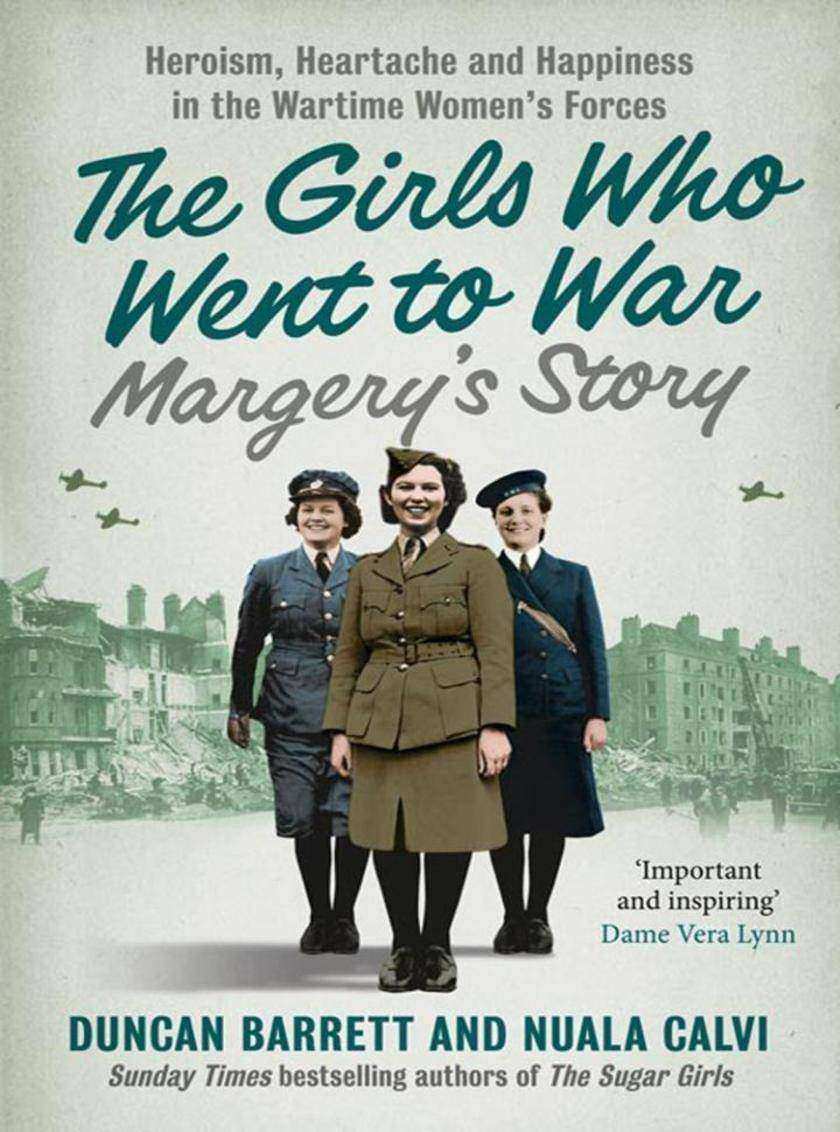
Margery’s Story
¥9.71
From the bestselling authors of The Sugar Girls and GI Brides, this is Margery’s story, one of three true accounts from the book The Girls Who Went to War. “‘Who does that man think he is?’ Margery muttered to a girl standing next to her. The words had slipped out before she could stop herself, but she realised, to her horror, that the warrant officer had heard them. ‘What was that?’ he demanded, striding over and fixing her with an angry stare. Margery gulped – but there was no going back now.” In the summer of 1940, Britain stood alone against Germany. The British Army stood at just over one and a half million men, while the Germans had three times that many, and a population almost twice the size of ours from which to draw new waves of soldiers. Clearly, in the fight against Hitler, manpower alone wasn’t going to be enough. Margery Pott signed up for the Women’s Auxiliary Air Force, leaving her quiet home for the rigours of training, the camaraderie of the young women who worked together so closely and to face a war that would change her life forever. Overall, more than half a million women served in the armed forces during the Second World War. This book tells the story of just one of them. But in her story is reflected the lives of hundreds of thousands of others like them – ordinary girls who went to war, wearing their uniforms with pride.
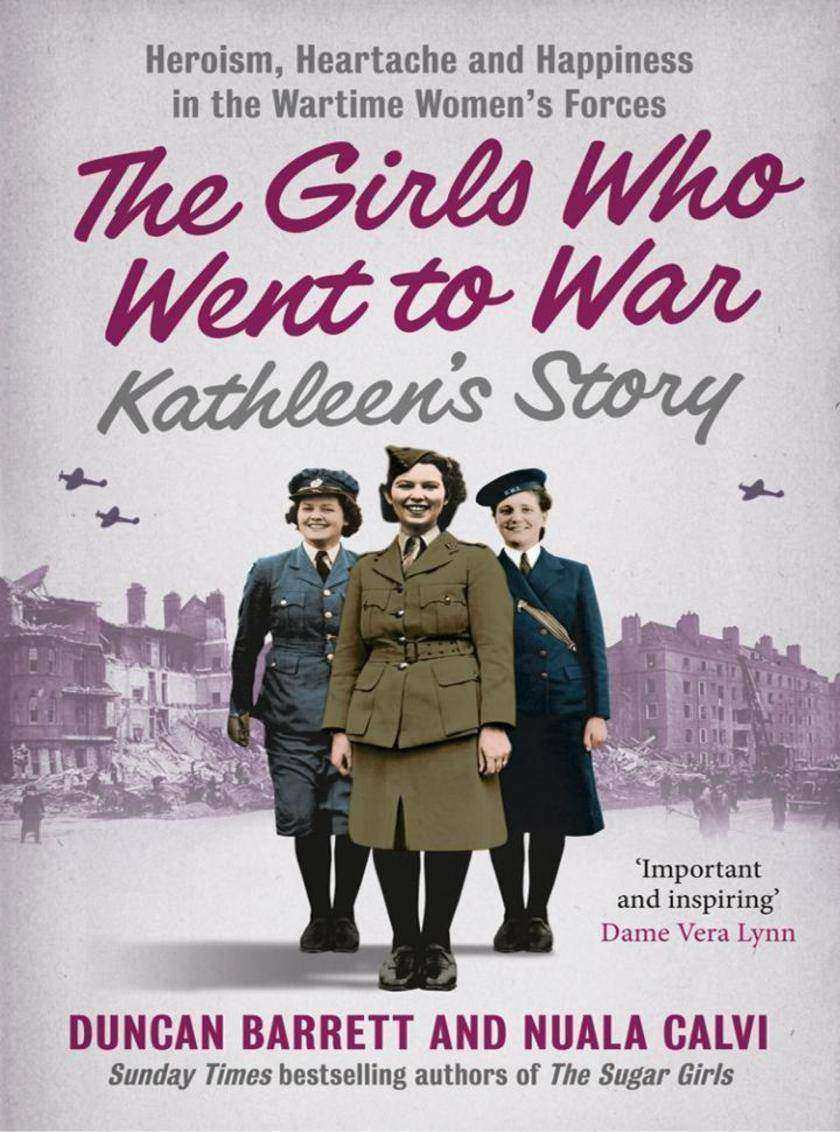
Kathleen’s Story
¥9.71
From the bestselling authors of The Sugar Girls and GI Brides, this is Kathleen’s story, one of three true accounts from the book The Girls Who Went to War. “Boxing Day was cold and frosty, and by the time Kathleen and the lads arrived at the football pitch she was already shivering. As they stood watching the game, Arnold silently took her hand and put it inside the pocket of his greatcoat. It was a small gesture, but it told her that she belonged to him now, and to Kathleen nothing had ever seemed so romantic.” In the summer of 1940, Britain stood alone against Germany. The British Army stood at just over one and a half million men, while the Germans had three times that many, and a population almost twice the size of ours from which to draw new waves of soldiers. Clearly, in the fight against Hitler, manpower alone wasn’t going to be enough. Nanny Kathleen Skin signed up for the WRNS, leaving her quiet home for the rigours of training, the camaraderie of the young women who worked together so closely and to face a war that would change her life forever. Overall, more than half a million women served in the armed forces during the Second World War. This book tells the story of just one of them. But in her story is reflected the lives of hundreds of thousands of others like them – ordinary girls who went to war, wearing their uniforms with pride.

The 9/11 Dogs
¥9.71
Meet the dogs who searched for life amongst the ruins of the Twin Towers. Many heroes were made on 9/11 and in the weeks that followed. Not all of them showed human courage. Some of them could only show that they were truly man’s best friend. German Shepherds, Labradors and Spaniels accounted for the majority of the four-legged heroes. Over three hundred search and rescue dogs worked the pile at Ground Zero and the crash site at the Pentagon. For hours they searched, fighting off exhaustion with sheer determination and they continued every day long after the hope of finding survivors had passed. There were faithful Guide dogs who helped their sightless owners out of the Twin Towers and led them to safety showed unstinting devotion in the face of adversity. And later, therapy dogs arrived to bring comfort to the bereaved and confused. At every stage of the operation, dogs were there helping humankind in various roles. And invaluably, they provided comfort and reassurance and lifted spirits by their pure presence. Sadly many of the dogs are no longer with us but their achievements will never be forgotten. Isabel George was fortunate that the people close to the dogs were pleased to be asked to share their stories. This book is to honour the dogs and their people.

D-day Dogs: Remarkable true stories of heroic dogs
¥9.71
Incredible true stories of canine loyalty in the Second World War. There were dogs involved with the landings, dogs the soldiers could not bear to leave behind and dogs trained to patrol, protect and locate. The dogs sailed with the Merchant Navy and brought their boats into dangerous waters to retrieve the wounded or stranded. They were on land, in the air and on the water during the D-Day operation – playing their special part in every aspect. Through this inspiring short collection of the true stories of four of these canine heroes the remarkable achievements of the D-Day dogs are brought to life.

Little Girl Lost: The true story of a broken child
¥9.71
The fourth in a series of true short stories from foster carer Mia Marconi. Kira first came to foster carer Mia Marconi’s home on respite care when she was three. She had suffered an unimaginable amount of abuse in her short life. Although she couldn’t tie her shoe laces, she could smash a room to pieces; she fought against everything like a wild cat. At the age of five Kira moved permanently to live with Mia and her family, but by the time she was nine years old the whole family was at breaking point. Mia is the kind of person who won’t give in and believes she can always change things for the better, but try as she might she can’t change Kira. So after six years, with a very heavy heart, she is forced to question whether she can really help this lost and damaged child. Raw, shocking and honest, this short story will shed new light on the role of foster carers, revealing the kind of heartbreaking real life situations carers like Mia Marconi are confronted with every day.

Raw: The diary of an anorexic (HarperTrue Life – A Short Read)
¥9.71
Lydia was 19 years old and enjoying university with a loving family and great friends when she became anorexic. The doctors told her that she would die. This is Lydia’s account of what anorexia did to her, how it changed her and how it impacted on her family, friends and all her choices in life. Her story is told through letters and blogs that Lydia wrote at the best and worst of times, notes from her parent s and friends desperately trying to find a way through to her and doctors notes with the horrific exacting details. Lydia is now 23 and ‘recovering’. She strongly believes that recovery is possible, and feels she is almost there. She wrote her book to explain her deepest thoughts and to explain the painful mental torture that she endured and overcame. And she wrote it in the hope that others suffering would relate to it, and that other families watching their loved ones will be touched and understand more deeply how an eating disorder really feels.

Liverpool v Manchester United:Seeing Red (A Short Pass)
¥9.71
‘Seeing Red’ is an exclusive extract from the best-selling ‘Mad For It’, published in association with FourFourTwo magazine. It examines one of the greatest sporting rivalries from the viewpoint of the people that matter; the fans. ‘Mad For It’ proves that some football matches are far more than just a game. These short extracts, from the original book published in association with FourFourTwo magazine, provide a fresh and revealing insight into the people that make these matches matter – the fans – using their own words and stories to illuminate the conflicts, tensions, histories and celebrations behind these unforgettable games. This first essay examines the biggest rivalry in English, if not World, football. Led by Sir Alex Ferguson and Kenny Daglish, games between Manchester United and Liverpool stir up some of the strongest emotions of any sporting event. On match days, two of the biggest cities in the UK come to a standstill. ‘Seeing Red’ gets to the root cause of the rivalry and examines why it matters so much.

50 Quick Cleaning Tips
¥9.71
Contained within this book are 50 quick and easy common-sense tips to help you clean your home and possessions. Despite a huge number of specialist - and expensive - cleaning products on the market, time has taught us that you don't have to spend a fortune to make your household look like it has been cleaned by the professionals! This quick-read guide has been specially formatted for today's e-readers, with each tip indexed for easy access.

Taylor Swift: The Whole Story FREE SAMPLER
¥9.71
INCLUDES EXCLUSIVE BONUS CHAPTER: The Wit and Wisdom of Taylor Swift The first 2 chapters from the full story of Taylor Swift’s stratospheric rise to fame; all any dedicated Swifty needs to know about the pop superstar who’s taking over the world. A small-town girl with an incredible talent, and the strength to realise her dream, Taylor has grown into an award-winning, chart-topping artist and worldwide star, as well as a strong and stylish woman. But how did she get there? And what lies in store for her in the future? From childhood dreams of a musical future in Pennsylvania, to determined and budding teen musician with a trademark she’s stayed faithful to ever since: honest lyrics about real-life events; her fight to be taken seriously in the music industry, through to the rewards of success and the intense pressure of expectation, Taylor Swift: The Whole Story is a full account of Taylor’s incredible journey, with everything you need to know about America’s Sweetheart. This compelling book is packed full of fascinating details revealing the true Taylor – what drives, motivates and moves her, how she overcame the challenges that loomed on the road to fame and how authentic her wholesome image is, plus the truth about her relationships with Harry Styles, Jake Gyllenhaal and Conor Kennedy and who she’s really talking about on her tracks. The full portrait of a girl who could so easily have faded into the background – but who blossomed in the spotlight into a grounded, graceful and inspiring young woman.

Jessie’s Story
¥9.71
From the bestselling authors of The Sugar Girls and GI Brides, this is Jessie’s story, one of three true accounts from the book The Girls Who Went to War. “Since Jessie’s surname was Ward, she was one of the last to hear what role she had been assigned to. Mary and Olive had already been told they were going to an ack-ack training camp in Berkshire, and she crossed her fi ngers, hoping that she would be setting off with them. Finally, the corporal came to her name. ‘Private Ward,’ she called out. ‘Anti-aircraft.’ At that moment, Jessie couldn’t have been happier. She was joining the artillery, and would soon be giving the Germans what for.” In the summer of 1940, Britain stood alone against Germany. The British Army stood at just over one and a half million men, while the Germans had three times that many, and a population almost twice the size of ours from which to draw new waves of soldiers. Clearly, in the fight against Hitler, manpower alone wasn’t going to be enough. Eighteen-year-old Jessie Ward defied her mother to join the ATS, leaving her quiet home for the rigours of training, the camaraderie of the young women who worked together so closely and to face a war that would change her life forever. Overall, more than half a million women served in the armed forces during the Second World War. This book tells the story of just one of them. But in her story is reflected the lives of hundreds of thousands of others like them – ordinary girls who went to war, wearing their uniforms with pride.

If Only He’d Told Me: A foster family pushed to the limits
¥9.71
The third in a series of true short stories from foster carer Mia Marconi. Brody had been on the at-risk register since birth but was only removed from his alcoholic parents when he reached the age of six. Foster carer Mia Marconi was thrilled when he first arrived – a boy the same age as her son. It can be so bewildering for foster children when they arrive. The older ones are usually withdrawn and sullen. The younger ones will be screaming, spitting at you, making themselves sick and throwing themselves on the floor. For Mia, it’s normally her boisterous, happy children who provide the comfort at the beginning, because why should they trust another adult. Children always feel safe and secure when there are other children about. Mia believes it’s through making relationships with other children that they begin to trust adults again. But little did she know that six-year-old Brody was actually taking his anger and frustration out on her son. She quickly begins to realise the heavy price her family has had to pay.

My Psychic Casebook
¥9.71
Have you ever wondered what goes on behind closed doors at a psychic reading? Meet ‘Selfridges Psychic’ Jayne Wallace who reads for over 100 international clients every week – from CID officers to media moguls, housewives to royalty and celebrities. Now she opens her client casebook to share the most shocking, touching and simply amazing readings that will make you laugh and cry – and leave you in no doubt that the spirit lives on. Jayne is renowned for getting straight to the point, with no preamble – she has seen spirits since the age of five and connects quickly to a person’s loved ones who have passed, bringing important messages and healing. In My Psychic Casebook, Jayne tells the stories exactly as they happened, and explains the techniques she uses to link with her clients. Just like a good novel, you’ll be instantly engrossed – except that all these stories are true. As the only department store medium in the world, in this short story, Jayne offers a unique insight into the work of a top clairvoyant, as well as shining a light on the remarkable truths behind the questions that concern us all.

Daddy’s Little Princess: Part 1 of 3
¥9.71
The latest title from the internationally bestselling author and foster carer Cathy Glass. Beth is a sweet-natured child who appears to have been well looked after. But it isn’t long before Cathy begins to have concerns that the relationship between Beth and her father is not as it should be. Little Beth, aged 7, has been brought up by her father Derek after her mother left when she was a toddler. When Derek is suddenly admitted to hospital with psychiatric problems Beth is taken into care and arrives at Cathy’s. Beth and her father clearly love each other very much and Derek spoils his daughter, treating her like a princess, but there is something bothering Cathy, something she can’t quite put her finger on. Meanwhile Cathy’s husband is working away a lot and coming home less at weekends. Then, suddenly, everything changes. Events take a dramatic turn for both Beth and Cathy and her family; as Cathy strives to pick up the pieces all their lives are changed forever.

10 Amazing Bridges
¥9.71
This quick-read guide introduces the reader to ten of the most amazing bridges in the world. Including photographs of every bridge and a brief description of the history of the structure, this ebook has been specially formatted for today's e-readers.

New year`s milk
¥9.56
New year`s milk

Rū?ītis
¥9.32
Cartea e ca o pies? de teatru alc?tuit? din personaje, parantezele autorului, dialoguri, secven?e, scene, acte, cu leg?tura necesar?, intre acestea. ?n treac?t fie spus, critica poate s? ?ntre?in? longevitatea operei, dac? are destul? vigoare ?i dac? opera e de calitate. Sunt vorbe optimiste la vremea Internetului care, deocamdat?, nu de?ine puterea controlului critic ?i nici nu se ?ntrev?d ?anse de aceast? natur?. Tocmai de aceea pericolul dispari?iei c?rt?ii de h?rtie pare anun?area unui cataclism. Noi mai credem ?n ceva. R?m?ne hot?r?t c? interpretarea critic?, pentru a fi c?t mai aproape de text, trebuie s? se asocieze cu "partea estetic?" a demersului, care e scriitura, citatul, descrierea ?i altele. O "conversa?ie", pe c?t posibil neretoric?.
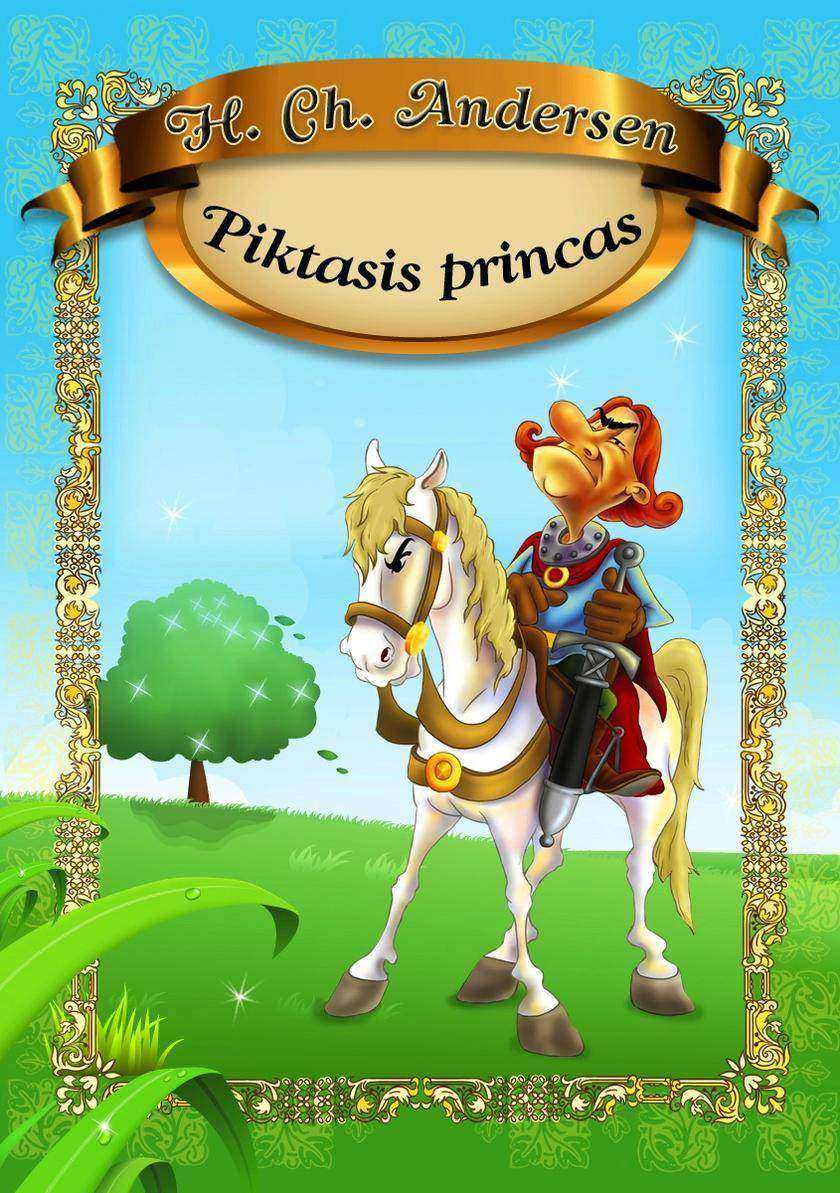
Piktasis princas
¥9.32
i acest volum intr ?n seria celor pregtitoare, anun?nd O istorie politic a literaturii rom?ne postbelice. Nu e vorba de un ?rzboi cu estetismul”, reanim?nd fantoma lui Gherea, ci de reevaluri pe temei estetic, la mai multe m?ini, folosind achiziiile criticii literare; i, firete, de recontextualizri (interog?nd epoca), in?nd cont, ?ns, de fluctuaiile recepiei i de capricioasa meteorologie politic. ?n fond, suntem consecveni cu programul, anunat ?nc de la debut (Orizontul lecturii, 1983), ?neleg?nd c, sociologic judec?nd, nu putem examina fenomenul literar retez?ndu-i ombilicul istoric. Generaia orfelin discut, prin profiluri sintetizatoare, despre o serie creatoare, av?nd drept numitor comun vitregele condiii formative; ea a fost modelat de interdicii (lecturi clandestine, maetri ?ascuni”, biblioteci epurate), provoc?nd o reacie polemic (ruptura) i promov?nd, astfel, la start, un program negativ. Dar, ?n acelai timp, este o generaie auroral, cu rol de verig, redescoperind – euforic – tradiia, definind o stare de spirit, angaj?ndu-se, prin combustie creatoare, la o lucrare comun, recuperatoare, fecund, susinut, prin propulsie adjectival, de o critic solidar, risipind i cronici ?tactice”, cum recunotea Matei Clinescu. Chiar dac noi discutm, ?n acest volum, poeii ei, evident nu poate fi vorba doar despre o generaie de poei, transport?nd legenda Labi, anun?nd, prin voci tinere, o nou epoc de lirism. Nu e vorba, aadar, de o compact ?echip” liric, ci de un buchet de personaliti, cu voci distincte, evolu?nd ?n direcii imprevizibile, isc?nd, ?n timp, disensiuni, controverse ?nfierb?ntate, ierarhizri provizorii. i propun?nd un inventar tematic, hrnind un imaginar, p?n la un punct, comun, definind o fizionomie specific. (Adrian Dinu Rachieru)
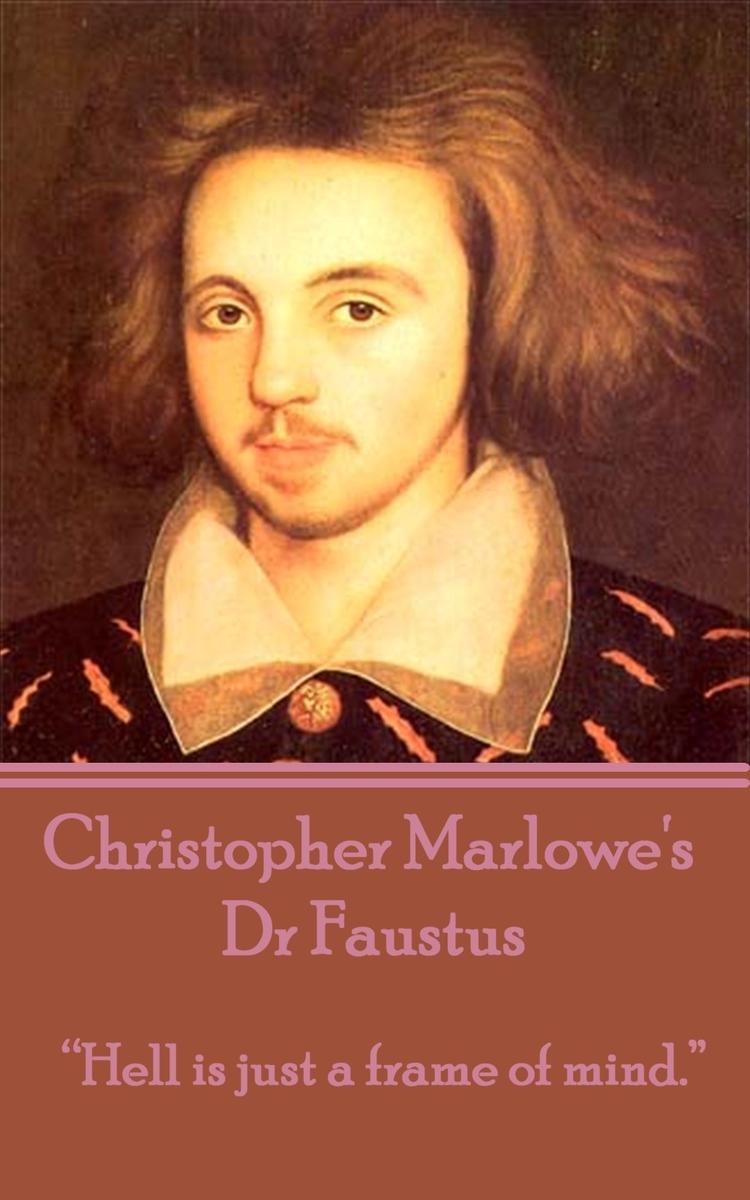
Dr Faustus - Hell is just a frame of mind.
¥9.32
In this foundational classic play, Christopher Marlowe beautifully retells the legend of Doctor Faustus in a masterful combination of verse and prose. The celebrated moral of the play is about how excessive ambition and unlimited lust for knowledge and power lead to self-destruction and damnation. The protagonist in the story is a talented lower-class man who is obsessed with the study of sciences and the secrets of life. His excessive academic ambition and his reliance solely on logic and reason lead him to cogitate about the nature of the world and its existence and to question the utility of the "e;doctrine of Divinity."e; Unsatisfied with the knowledge that pure and experimental sciences can offer, he eventually decides to explore the curious world of Black Magic. Through the recital of a strange incantation, Faustus succeeds in summoning a devil called Mephistopheles who informs him that he will only obey his orders once a pact is signed between Faustus and the devil's master: Lucifer. The pact is signed by Faustus' own blood and stipulates that in return of Mephistopheles' services, which unexpectedly turn to be unworthy by the end, he must give his soul over to Lucifer. The denouement of the play opens the floor for different speculations about Faustus' damnation or salvation.

Penki i? vienos ank?ties
¥9.24
O carte incitant? despre unul dintre cei mai mari poe?i interbelici, taxat pe nedrept de c?tre G. C?linescu drept un poet minor. Studiul este semnat de cunoscutul exeget literar Mihai Cimpoi, pre?edinte al Uniunii Scriitorilor din R. Moldova, Membru al Academiei Rom?ne. Cartea se adreseaz? elevilor, studen?ilor, precum ?i publicului larg de cititori.
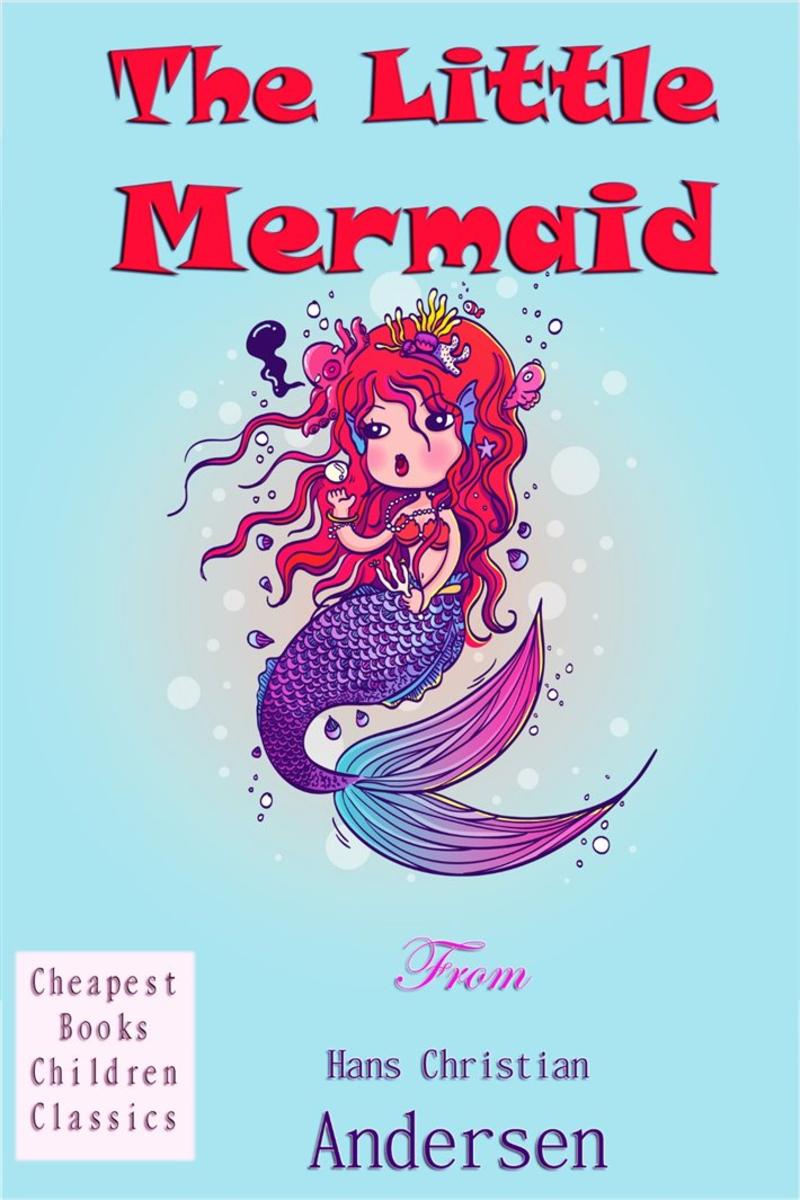
The Little Mermaid
¥9.24
Far out in the ocean the water is as blue as the petals of the loveliest cornflower, and as clear as the purest glass. But it is very deep too. It goes down deeper than any anchor rope will go, and many, many steeples would have to be stacked one on top of another to reach from the bottom to the surface of the sea. It is down there that the sea folk live. Now don't suppose that there are only bare white sands at the bottom of the sea. No indeed! The most marvelous trees and flowers grow down there, with such pliant stalks and leaves that the least stir in the water makes them move about as though they were alive. All sorts of fish, large and small, dart among the branches, just as birds flit through the trees up here. From the deepest spot in the ocean rises the palace of the sea king. Its walls are made of coral and its high pointed windows of the clearest amber, but the roof is made of mussel shells that open and shut with the tide. This is a wonderful sight to see, for every shell holds glistening pearls, any one of which would be the pride of a queen's crown.

Die Hirtin und der Schornsteinfeger
¥9.24
Este Leopardi un poet pesimist, aa cum l-a clasat tradiia Nu. Din perspectiva zilei de azi, el apare mai degrab ca un poet tragic, ca un exponent al categoriilor existeniale fundamentale. Nu moartea ca atare l sperie pe Leopardi, ci murirea, adic manifestarea ei procesual. Tot astfel viaa leopardian este vieuire. Desfurarea acestora e inversat: trirea vieii (vieuirea) e retrospectiv, iar trirea morii (murirea) e perspectiv. Inversiunea ontologic este temeiul mitopo(i)eticii leopardiene. Cartea ne propune un Leopardi modern i postmodern, un spirit intercultural i multicultural n siajul integrrii europene. Nu lipsete, bineneles, odiseea receptrii lui n spaiul cultural romnesc, ca pattern al lirismului arhetipal, alturi de Eminescu.” (Mihai Cimpoi)Un studiu incitant despre unul dintre cei mai mari poei ai lumii.




 购物车
购物车 个人中心
个人中心



